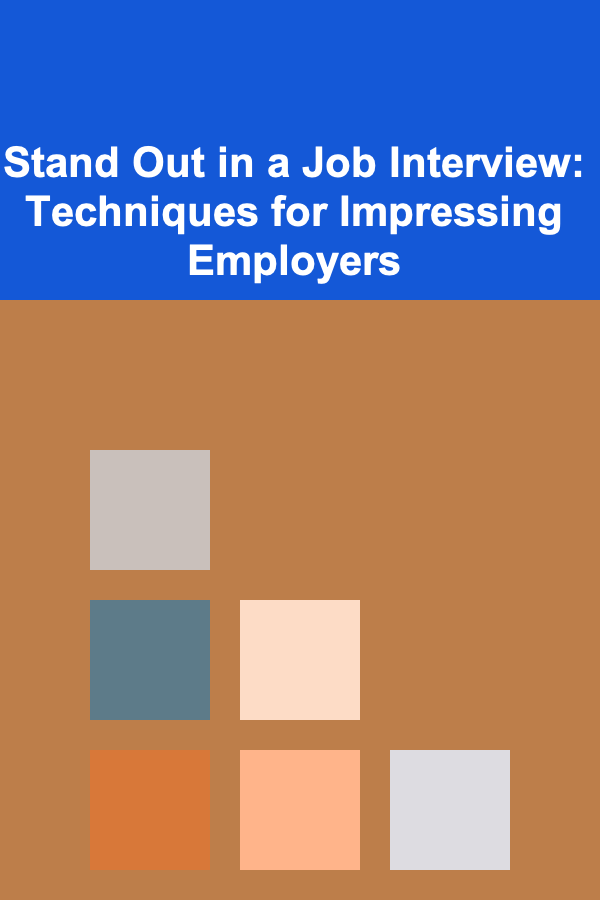
Stand Out in a Job Interview: Techniques for Impressing Employers
ebook include PDF & Audio bundle (Micro Guide)
$12.99$6.99
Limited Time Offer! Order within the next:

Job interviews are a pivotal part of the hiring process. They provide employers with the opportunity to assess a candidate's skills, experience, and cultural fit within the organization. But for candidates, interviews are often the final hurdle in securing a job. Standing out in an interview is about more than simply answering questions correctly; it's about demonstrating your value, showing your enthusiasm, and presenting yourself as a solution to the company's needs.
In this actionable guide, we'll explore a range of techniques that can help you impress employers, make a lasting impression, and increase your chances of landing the job.
Prepare Thoroughly
Preparation is the foundation for a successful job interview. Without proper preparation, you may miss opportunities to showcase your strengths, fail to answer questions effectively, or fail to align yourself with the company's values. Here's how to prepare:
1.1 Research the Company
Before the interview, take the time to thoroughly research the company. Understand its mission, values, products, services, and recent developments. This knowledge will not only help you answer questions in a way that aligns with the company's goals but will also demonstrate your genuine interest in the role.
- Actionable Tip: Visit the company's website, read recent news articles or press releases, and explore their social media channels. Pay attention to their culture and any recent initiatives or achievements. Incorporate this information into your responses to show that you're knowledgeable and invested.
1.2 Understand the Role
Make sure you clearly understand the job description and its requirements. Highlight the skills, qualifications, and experiences that align with your own background. Think about how your experiences match the role's responsibilities and prepare specific examples that demonstrate your competencies.
- Actionable Tip: Break down the job description and match each key responsibility with your past experiences. Create a list of achievements or projects that reflect the skills needed for the job. This will allow you to draw direct connections between your background and the job at hand.
1.3 Prepare for Common Interview Questions
While each interview is unique, certain questions are commonly asked across most job interviews. By preparing for these in advance, you'll be able to respond confidently and thoughtfully. Common interview questions include:
-
"Tell me about yourself."
-
"What are your strengths and weaknesses?"
-
"Why do you want to work here?"
-
"Where do you see yourself in five years?"
-
Actionable Tip: Practice your responses to these questions, but avoid sounding robotic. Instead, aim for a conversational tone that highlights your qualifications while showing enthusiasm for the role. Use the STAR method (Situation, Task, Action, Result) to structure your answers, especially for behavioral questions.
Highlight Your Value Proposition
One of the most effective ways to stand out in an interview is by articulating your unique value proposition. This is a clear and compelling statement of why you are the best fit for the job and how you can solve the company's problems.
2.1 Know Your Unique Strengths
Think about the unique skills, experiences, and qualities you bring to the table. These could be technical skills, soft skills, or experiences that set you apart from other candidates. Be ready to highlight how these strengths align with the company's needs and how they will benefit the organization.
- Actionable Tip: Create a personal "elevator pitch" that succinctly explains your strengths and what you offer. This should be no more than 30 seconds long but should emphasize your unique abilities and experiences that directly apply to the role.
2.2 Tailor Your Answers to Address Company Needs
During the interview, make sure your responses directly relate to the company's needs. For example, if you know the company is facing challenges with customer retention, you can highlight any experiences you have in customer relationship management and explain how your expertise could help improve their retention rates.
- Actionable Tip: As you prepare for the interview, write down at least three specific ways you can contribute to the company's goals. Be prepared to bring up these points when answering questions, showing that you've thought about how you can directly impact their business.
Demonstrate Enthusiasm and Cultural Fit
Employers are not just looking for someone who can do the job---they want someone who will fit into the company culture and be excited about the role. Your attitude and demeanor can have a significant impact on how the interviewer perceives you.
3.1 Show Genuine Enthusiasm
Employers can tell when a candidate is truly passionate about the position and the company. Be sure to communicate your excitement for the role and your eagerness to contribute to the team. Enthusiasm can be contagious, and it can make you stand out from other candidates who may seem disinterested or detached.
- Actionable Tip: When answering questions, convey your enthusiasm through both your words and body language. Smile, make eye contact, and speak with energy. For example, when discussing why you want the job, focus on how the role excites you and aligns with your career goals.
3.2 Showcase Your Cultural Fit
Cultural fit is often just as important as skills and experience. Employers want to know that you'll thrive within the company's work environment and values. Research the company culture beforehand, and make sure your responses demonstrate that you share their values and are excited to be part of their team.
- Actionable Tip: Listen closely to the interviewer's language during the interview. They may drop clues about the company culture, such as references to teamwork, innovation, or flexibility. Use these clues to tailor your responses and highlight how your own work style and values align with theirs.
Ask Thoughtful Questions
At the end of the interview, you'll usually be asked if you have any questions. This is an opportunity for you to learn more about the company and the role, but it's also a chance to show that you're engaged and thoughtful.
4.1 Ask About the Role and Team
Inquire about the specific responsibilities of the role and the team dynamics. This not only helps you gauge whether the position is the right fit for you, but it also shows the interviewer that you are thinking about how you will contribute to the team and organization.
- Actionable Tip : Ask questions such as:
- "What are the immediate priorities for this role?"
- "How would you describe the team culture?"
- "What are the biggest challenges the team is currently facing?"
4.2 Ask About Growth Opportunities
Employers appreciate candidates who are interested in personal growth and long-term success. Asking about opportunities for professional development or career progression shows that you're thinking ahead and want to make a lasting impact within the organization.
- Actionable Tip : Ask about opportunities for learning and growth, such as:
- "How does the company support ongoing development and training?"
- "What are the typical career paths for someone in this role?"
Follow Up After the Interview
Sending a thoughtful follow-up email after the interview can reinforce your interest in the role and leave a positive, lasting impression.
5.1 Express Gratitude
In your follow-up email, be sure to thank the interviewer for their time and reiterate your enthusiasm for the position. This simple gesture shows professionalism and appreciation, which can help you stand out among other candidates.
- Actionable Tip: Keep your follow-up email concise and focused. Thank the interviewer for the opportunity, mention a key moment from the interview that reaffirmed your interest in the role, and express your eagerness to move forward in the process.
5.2 Reiterate Your Fit for the Role
Use your follow-up email as an opportunity to reiterate why you're the best candidate for the position. You can briefly mention a key strength or qualification that you discussed during the interview to remind the employer of your value.
- Actionable Tip: End your email by expressing your excitement about the next steps in the hiring process. This reinforces your enthusiasm and keeps the conversation going.
Conclusion
Standing out in a job interview is about more than just answering questions well; it's about demonstrating your preparedness, enthusiasm, and ability to add value to the company. By thoroughly preparing, articulating your unique strengths, showcasing your cultural fit, asking insightful questions, and following up after the interview, you can significantly increase your chances of leaving a lasting impression on the interviewer.
Remember, job interviews are a two-way conversation. While you are being evaluated, you also have the opportunity to evaluate whether the company and the role are a good fit for you. By taking a proactive, thoughtful approach to the interview process, you not only increase your chances of success but also gain a deeper understanding of whether this job is the right next step in your career journey.
Reading More From Our Other Websites
- [Home Party Planning 101] How to Set Up a Dessert Bar for Your Home Party
- [Ziplining Tip 101] Best Zipline Tours Integrated with Indigenous Cultural Experiences on Canada's Pacific Coast
- [Weaving Tip 101] Weaving Traditions Around the World: Lessons from Natural Fiber Artisans
- [Toy Making Tip 101] How to Design and Sew a Modular Dollhouse Furniture Set for Tiny Hands
- [Personal Care Tips 101] How to Choose the Best Sunscreen for Sensitive Eyes
- [Home Staging 101] How to Stage Your Home's Bathrooms to Impress Buyers
- [Personal Investment 101] How to Stay Disciplined in Your Investment Strategy
- [Organization Tip 101] The Best Luxury Vinyl Plank Options for High-Traffic Areas
- [Home Soundproofing 101] How to Soundproof a Home for Better Home Entertainment
- [Organization Tip 101] How to Use Drawer Dividers for Better Utensil Management

How to Identify and Understand Your Target Audience for Sales Success
Read More
How to Keep Your Home Clutter-Free While Still Keeping It Clean
Read More
Making Money from AI and Deep Learning: A Passive Income Guide
Read More
The Ultimate Guide to Affordable Hobbies and Activities for All Ages
Read More
How To Incorporate the Y2K Fashion Revival
Read More
Choosing the Best Bug Spray and Repellents: A Comprehensive Guide
Read MoreOther Products

How to Identify and Understand Your Target Audience for Sales Success
Read More
How to Keep Your Home Clutter-Free While Still Keeping It Clean
Read More
Making Money from AI and Deep Learning: A Passive Income Guide
Read More
The Ultimate Guide to Affordable Hobbies and Activities for All Ages
Read More
How To Incorporate the Y2K Fashion Revival
Read More